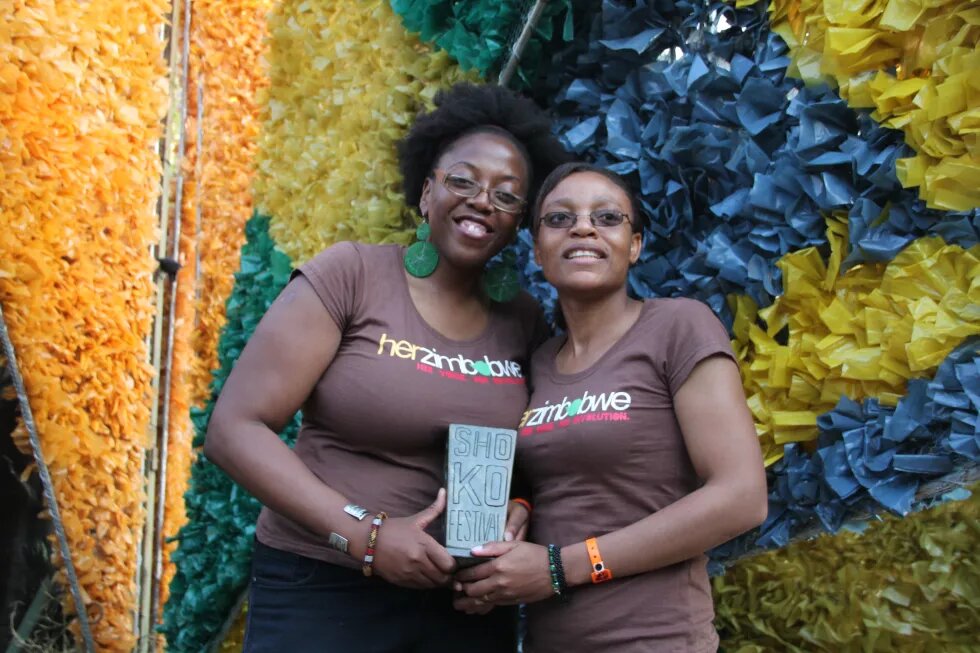

This year, Her Zimbabwe launched its first non-digital activities with a public discussion event, termed a ‘critical conversation’ during one of Harare’s biggest annual events, Shoko Festival in September. The exchange interrogated the effectiveness of women’s use of the internet in activism, under the theme ‘Women, New Media and Activism in Zimbabwe: Where We Are. Where We Are Going’.
Leading the onversation were four women who work with different forms of new media and technology in their professional lives; Delta Milayo Ndou, Social Media Editor for the Zimpapers Group, Aretha Mare, a founding member of Techwomen Zimbabwe and chemical technologist who works with girls and young women in the science-tech space and Kudzai Mubaiwawho has worked as Hub Manager with Muzinda Umuzi Hub, an innovation and entrepreneurship hub which seeks to build the digital skills and enterprise of young people with an interest in technology.
A unique feature about the panel was the inclusion of a Kenyan blogger, Brenda Wambui, who is Co-Founder of Brainstorm, voted Kenya’s best political blog in 2014 through the Bloggers’ Association of Kenya. Her Zimbabwe Founder, Fungai Machirori, stated that the inclusion of a panelist from outside Zimbabwe was deemed important for purposes of expanding the discussion and looking beyond issues and perspectives that are local to Zimbabwe.
Ndou and Machirori, the moderator for the conversation, listen to Wambui as she speaks. (Photograph by Fungai Tichawangana)
“I think it’s important for Zimbabwe which has, for a long time, been closed off from a lot of issues and conversations – as a result of our politics – to have a chance to interact with different ideas, views and opinions,” said Machirori.
While Ndou and Wambui are opinion leaders in content creation, Mare and Mubaiwa provided a more technological perspective to the debate. In her remarks, Ndou referred to some female-led initiatives that have enjoyed success via social media, such as Celebrities Combined Trust which was founded by Tinopona Katsande. The Trust has, in the past, mobilised funds for health benefits for the poor, mainly through social media.
“When I saw them doing that I thought okay, this is a good thing because it tells us that social media is a way for us to connect to do good,” she said.
Ndou added that an increase in online advocacy by women will be crucial towards dispelling the popular belief that women only use digital media for sex videos and images, as portrayed by how the media positions women in viral sex tape scandals.
Her Zimbabwe Critical Conversation - Women, New Media and Activism in Zimbabwe - Her Zimbabwe
 Watch on YouTube
Watch on YouTube
Besides being an easy to penetrate platform, the internet also permits certain liberties that are generally not available in other forms of media. For example, one just needs internet access, some technological knowhow and a gadget to start an online conversation. In narrating how Brainstorm was started, Wambui shared how she and her partners had decided to form an alternative news platform that offered greater context and a range of perspectives on issues that are of importance to Kenyans.
She also referred to unlimited space and freedom of expression as some of the freedoms that women can take advantage of by using the internet.
“The internet is a democratising force that is good for change and it changes our perspectives,” she added.
Mare explained that her focus on females in her work was to encourage the uptake of science and technology as subjects in schools, and by professional young women.
“Looking at one of the higher education institutions, their recent enrollment into a computer science class was two women out of 49,” she noted. “That is 47 boys, so there is a gap.”
Mubaiwa emphasised that Zimbabwe has to move forward with other countries who have embraced the digital age.
“It is indeed my personal belief that in Zimbabwe the future is young; most of us are young,” stated Mubaiwa. “And the future is digital. Whether we like it or not, everything is going online and ladies the future is female,” she concluded.
To date, Her Zimbabwe has mainly been an online platform which has yielded vast debate and discussions. Machirori highlighted that offline activity was an opportunity to engage people who may not be in a position to fully participate in online discussions.
“While online space facilitates conversation brilliantly, the face to face encounters are still just as valid, if not even more, as they allow space for collective introspection, follow up and more elaborate explanation,” she said.
The organisation expects to hold more critical conversations around the country in an effort to grow its presence beyond Harare.
Her Zimbabwe was also honoured, at this year’s Shoko Festival, with a Hub Pioneer Award by the festival organisers.
Fungai Machirori and Natasha Msonza of Her Zimbabwe receive the Shoko Hub Pioneer Award (Photograph by Fungai Tichawangana)